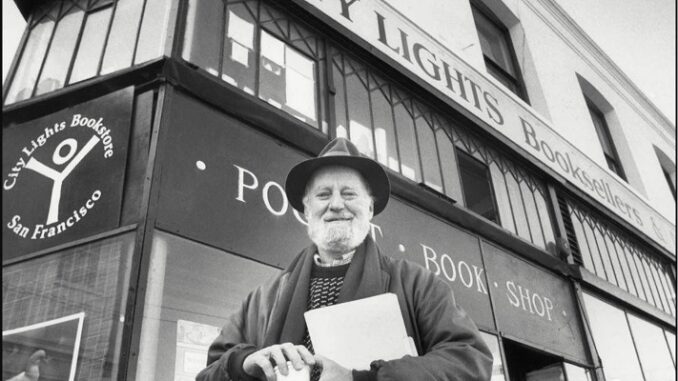
City lights
Alok Bhalla
This special issue of The Beacon (20 July 2022) on the Beat Poets has been curated by Jennie Skerl, a founding President of the Beat Studies Association in the US and a retired Dean from Westchester University. She is a recognised authority on the works of William Burroughs, Jane Bowles, Ed Saunders and other writers of the Beat generation.
The Beacon decided to celebrate the 70th anniversary of the City Lights Publishers and Bookstore in 1953 in San Francisco by Lawrence Ferlinghetti by putting together four introductory essays on four Beat writers by some of the best critics of their work. City Lights was named in honour of Charlie Chaplin’s famous film released in 1931. The bookstore occupies as important a place in the transformation of American poetics as Sylvia Beach’s Shakespeare and Company Bookstore set-up in Paris in 1919 does in the shaping of European Modernism. Both were set up at the end of horrific world wars and, perhaps, in the hope that a new utopia of books, art, film and music would lead to the renaissance of the imagination. Sylvia Beach published James Joyce’s Ulysses and her bookstore became the meeting place of disinherited writers and painters like Ernest Hemingway, F. Scott Fitzgerald, Henry Miller and Pablo Picasso; Ferlinghetti’s first publication was Allen Ginsberg’s Howl, which began with a lament over destruction of the best minds in America as well as its homage to new ‘Leaves of Grass’. Unfortunately, the longing for an imaginative and humane world evaporated very quickly with the American and European wars in Korea, Vietnam, Cambodia, Laos as well as intense and continuous colonial violence in Africa, the Middle East and Latin America by, what Bob Dylan called, ‘the masters of war.’
In 2001, San Francisco officially declared the City Lights Bookstore as a historic literary landmark. In doing that it may have saved the bookstore from shutting its doors forever. In 2019, the city also proclaimed March 24th as ‘Lawrence Ferlinghetti Day’ to celebrate his 100th birthday. He passed away in 2021. One wonders if he felt, despite his genial optimism (shared perhaps with Chaplin), that since the 1950s the world had travelled so far down a dark and winding road, that it was quixotic to expect the poets to leave us in a slightly better place, a little cleaner and well-lighted. Or was he was still waiting
at a final disarmament conference
in a new rebirth of wonder…
**
—Ed Sanders and the Sixties: To Change the World “Without a Drop of Blood”
— Jack Kerouac, On the Road, and Narrative Art
— A Brief Journalistic History of Women of the Beat Generation
– Allen Ginsberg’s “Howl”: Performing Communion
******

Leave a Reply